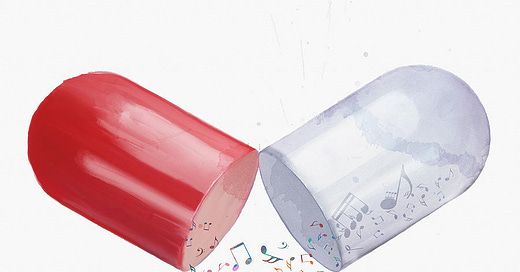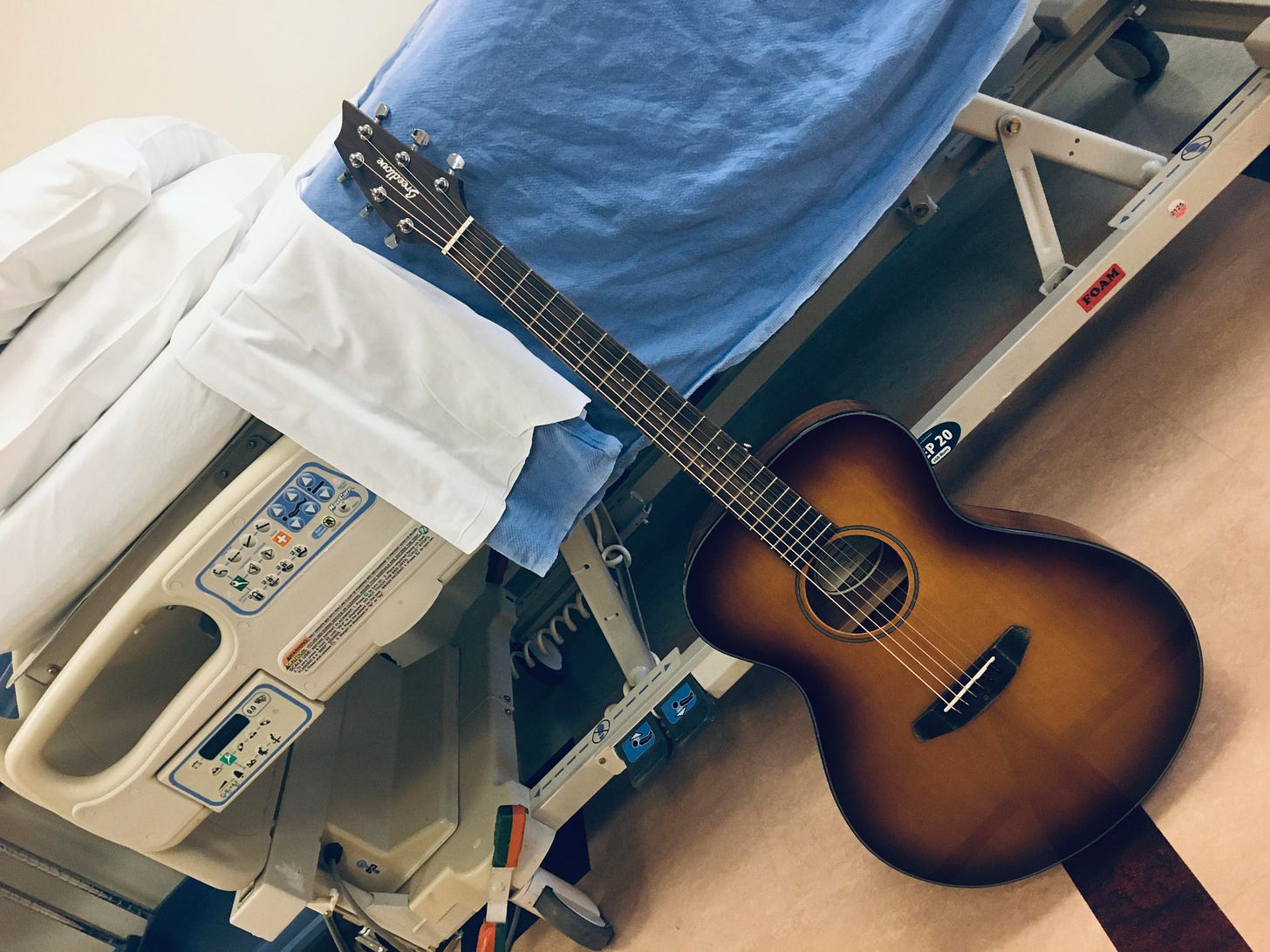The Music… It Heals My Soul
How do you bring back a sense of self and a sense of control when in the hospital? Ask for the music therapist
Hi Friends,
Thanks for reading! If you enjoy today’s post… please share.
Did you know that if you hit the heart at the top or the bottom of this email you will make my day and it will make it easier for others to find this publication. Thanks!
“I really needed this. I really needed something… different. Here in the hospital, it’s just like not being a whole person. The music… I feel it deep inside. It heals my soul. I just realized that nothing is healing my soul when I’m here. And when my soul is healed my body will be ready to heal too.” – A woman, in her 40s who had been in the hospital for over two weeks, after her music therapy session.
This is what music therapy does in a hospital setting - “It heals my soul”. Music therapy is many things… Yes, it’s an evidence-based practice. Yes, we track data, heart rate, blood pressure, respiratory rate and look at it quantitatively. Yes, music therapy helps prompt physiological changes and effects brain activity. But what makes music therapy unique (and much needed) in the hospital is that “It heals my soul.”
I hear a version of this almost every day. Oftentimes, after a music therapy experience, patients will say, “I feel like a ‘real’ person again.” I would say that “healing the soul” is a gateway to feeling like a real person again. And yes, when asked what music therapy is, we do need the legitimacy of saying - “Music Therapy is the clinical and evidence-based use of music interventions to accomplish individualized goals within a therapeutic relationship by a credentialed professional who has completed an approved music therapy program.” (American Music Therapy Association) After all, I, like all board-certified music therapists, have worked hard to attain credentials (education, degree, internship, board-certification exam, continuing education requirements) and we do have to educate and advocate that music therapy is a clinical practice. But what does music therapy really do in a hospital setting? “It heals my soul.”
Another way of framing it - Music Therapy helps to restore a sense of ‘self’ and a sense of ‘control’.
When you are admitted to the hospital, or diagnosed with cancer, two things immediately happen. You lose your sense of self and you lose a sense of control. Suddenly you become a ‘patient’ or are identified with your ‘diagnosis’. Or, you will forever be associated with the ‘C’ word. You are a ‘cancer patient’, have ‘cancer’, are ‘fighting cancer’ all the way to ‘cancer survivor’. That word will forever be a part of your new identity. You have lost your sense of self. (Or now have a new sense of self.)
When you are admitted into the hospital, you are told when to eat, when to sleep, when to walk (or not walk), when they will take your blood, take meds, have surgery, provide urine samples, be cleaned by strangers when you can’t get out of bed and have soiled yourself, when they will stick you to get blood sugar readings, that they will insert a catheter - the list goes on. You have lost all sense of control.
Losing a sense of self and/or a sense of control can have a profound effect on one’s mental state, increase anxiety, and generate a fear of the unknown - all of which can have an effect on medical outcomes. Doctors, oncologists, surgeons, nurses, respiratory therapists, physical therapists, clinical technicians, virtually everyone working on you in the hospital, are looking at you through the lens of your diagnosis. They have to. That is how they do their jobs to give the best care for your physical well-being. But what about your emotional self? Your sense of self? Your soul? Who is working on that?
She was just lying in bed staring… waiting. Waiting for the pain to ease. Waiting for counts to recover. Waiting to go home after over 50 days in the hospital. Just staring at the ceiling… waiting. In previous visits we sang songs together to help keep her spirits up, but now? It was different. I started with some ‘ethereal’ music on the guitar. Music to soothe… music to comfort… music to hold her in this space. After some time, she looked at me—connection. Soon, without thinking about it, I moved into a down-tempo version of Drift Away. She closed her eyes. As I was progressing through, her face started to change… softer. And when I sang the chorus - “Give me the beat boys, and free my soul. I wanna get lost in your rock ‘n’ roll and drift away.” - A soft smile. Something was connecting, the music, the song, was taking over. And every time I hit the chorus… a soft smile. When I got to the end, I wanted to keep this connection, this feeling, going so I simplified the music, almost drone-like, and the lyric (“Give me the beat boys, and free my soul. I wanna get lost in your rock ‘n’ roll and drift away.”) became a mantra. Continuously repeating around rhythmic block chords. On and on… It almost felt trance like (for me too.) After the music finally came to a close, after a long pause she said, “I was floating.” (Drifting?) “I was floating out and above my body. It felt… nice. It felt… safe. I felt… like a whole person. I was even above the pain.” When she reached for my hand as I was leaving, our eyes met for a moment. She smiled. I smiled.
When you go into the hospital, especially into critical care, you lose all sense of control. And not just the patients. I was asked to visit a woman in the ICU to help with comfort. She had been on a ventilator for several days. Her adult daughter was with her around the clock, trying to put on a good face. She was not very successful. I introduced myself and told her why I was there. She smiled and said, “Music… she loves music.” Then after being lost in a thought for a moment, “She loves Harry Belafonte. She actually met him once.” Then she started to cry. She has no control over anything right now. I took out the guitar and just started offering some soothing soundscape (for both). She held her mother’s hand and rested her head on her shoulder, seeming to allow the music in. Eventually I added some soft singing – “Day-O. Day-A-O. Daylight come and me want go home.” She looked at me with a slight smile through her tears. I kept the music slow… grounded… drone-like. I sang the phrase again. Then I asked her to join me, “Daylight come and me want go home.” We sang it together again… and again... and again. She sang to her mother and suddenly seemed to have some purpose—some sense of control. She has hard decisions to make in the coming days, but the music… It gave her some sense of control. “Daylight come and me want go home.”
“She’s so down about being in the hospital,” the nurse told me about her patient, a woman in her 90s. When I went into the room, she seemed to be staring at a book but not reading. She looked… withdrawn. I quietly said “hello” and asked how she was doing. “Terrible… all these years I’ve never been in the hospital. I had a little fall and…” in mid-sentence she stopped, “Is that a guitar?” “Yes, I’m a music therapist.” And like a beautiful sunrise, her face slowly brightened, and she suddenly looked so youthful. “I love music! I play the piano. I’m working on a Chopin Nocturne. I wish I was home to play.” “Can I play something for you?” I asked. “Please!” I played some classical style guitar. She was smiling the entire time. When I finished, she said, almost like a proclamation - “Music… is good for the brain, good for the soul, and good for peace on earth.” Then, she looked at me with a sly smile, “It’s also good in the bedroom to help… well, you know.” She winked at me. “How do you think I stayed out of the hospital all these years!” (Did I mention that she’s in her 90s?)
So… what does music therapy do? It gives a sense of self… it gives a sense of control…
“Music… is good for the brain, good for the soul, and good for peace on earth.”
And apparently, “It’s also good in the bedroom to help… well, you know.” (See above.)
The healing power of music…
What are you listening to these days to support your sense of self and sense of control? Or, that just makes you feel good. Let me know in the comments below. I love hearing from you.
(*The stories presented in this blog are based on accounts or experiences and are not actual accounts or experiences.)
Raymond Leone, MMT, MT-BC is a board-certified music therapist based in Northern Virginia and writes extensively about music and wellness.








Thanks for writing this. I’m seriously considering switching careers and becoming a music therapist (tho I’m 43 so it would be a big change at this point in my life…). I enjoy learning about different applications for MT. Music is such a huge part of me and so important to my own wellbeing, and I hope to use that to be in service to others one day. Appreciate the read.
Ray, writing these is such validation. Thank you. Just reading this lifts my spirits.